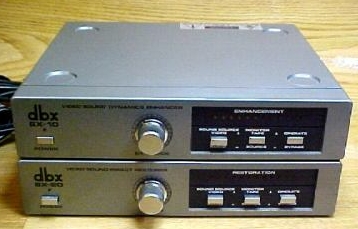Call me old school, but I can't help but think that it would be better to use a hardware EQ to deal with sound problems before putting the data on disc. Yet in all my searching, I can't find any references to anyone using an EQ in-line with their video equipment.
I'm converting my setup to include a DVR-533 instead of capturing to PC and encoding manually, so naturally I'm looking at ways to improve the audio/video before the signal reaches the disc.
Has anyone experimented in this regard? I'm considering using a full 15 band 'normal' EQ (that's 15 bands per channel - not one of those 5 or 7 band 'cheapie units') or perhaps picking up a parametric or paragraphic EQ and using that instead. Overall I'm not looking to make massive changes to the audio, I just want to try and clean it up a bit before it goes digital. This way if I am converting a bunch of old VHS tapes I won't have to manually rip and adjust the audio on each one.
Any thoughts? Has anyone else considered and/or tried this before?
Regards,
Savant
+ Reply to Thread
Results 1 to 6 of 6
-
-
My issue here was always cost. Audio errors range so much, that if audio tends to be "imperfect" it tends to have a handful of issues. Which would require a handful of audio hardware filters.
It was more economical to invest in SoundForge and clean digitally. And digital audio is a pretty much perfected science, far beyond video tech by at least a decade. I was running audio software on a 386 at one point.
Digital "loss" also tends to be negligible on most sources you have at home. If you're a studio, things may be different.
These folks have a number of devices, for the hardware route:
http://www.edirol.com/products/index.htmlWant my help? Ask here! (not via PM!)
FAQs: Best Blank Discs • Best TBCs • Best VCRs for capture • Restore VHS -
This is the method I've been using to sweeten and enhance audio tracks (if they can benefit from it)... I have an old school 10 band per channel EQ, and a trio of vintage video sound processors from dbx. One expands dynamic range, the other improves "impact", while the third provides bass enhancement. I usually only use the EQ and the bass enhancement device.Originally Posted by Savant
Older tapes and laserdiscs were not mixed with today's subwoofer equipped home theater systems in mind, so they sometimes sound pretty thin, and some are very weak in the bass area. After all, at one time the vast majority of videotapes and laserdiscs were viewed on regular TV's using the little speakers in the sets. A bit of mild tweaking prior to encoding (in my case, transfer to MPEG2 with a standalone DVD recorder) can be really helpful. It takes some practice and test recordings to get the hang of it, though. You don't want to overdo any EQ settings or other enhancements. -
video sound processors from dbx, Gshelley61....Now thats what I call Old School. I been looking on Ebay to find a dbx, either the price is really high or its in bad shape. Wow!!
-
These old dbx video sound units are the SX-10, the SX-20 and the SX-30. The SX-10 is the video sound dynamic enhancer, the SX-20 is the video sound impact restorer, and the SX-30 is the video sound bass enhancer. They pop up on eBay from time to time.
Here's a picture of what they look like...

-
I have a BBE Sonic Maximizer, but rarely use it anymore, since I bought the VST software plugin of the BBE product and it sounds just as good.
Similar Threads
-
Hardware issues in encoding
By videobread in forum ComputerReplies: 3Last Post: 23rd Nov 2011, 10:38 -
Amcap (using Ezcap hardware) pixelation issues.
By Joesavage1 in forum Capturing and VCRReplies: 1Last Post: 5th May 2011, 13:51 -
Using equalizers in Sound Forge 10
By Xdecade in forum AudioReplies: 0Last Post: 6th Jun 2010, 14:12 -
Hardware Issues
By bevills1 in forum ComputerReplies: 3Last Post: 29th Oct 2009, 14:05 -
Hardware to correct Chroma Shift?
By durieux in forum RestorationReplies: 1Last Post: 10th May 2007, 04:26




 Quote
Quote